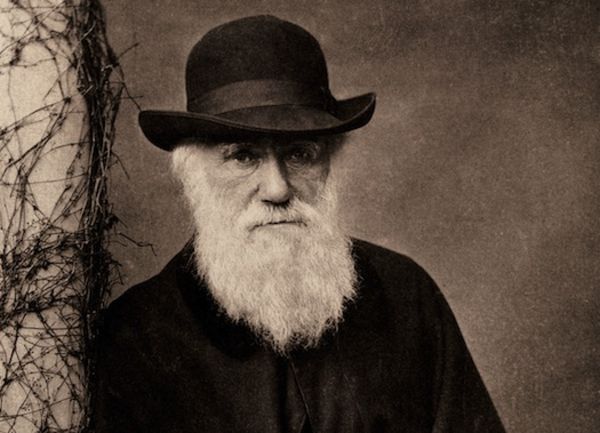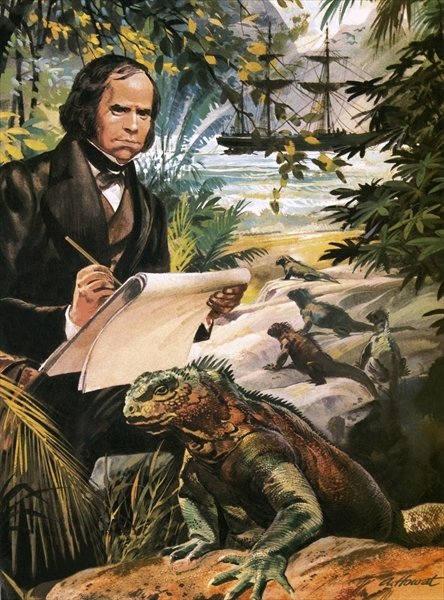
This next unit mainly focused on the subject of evolution. Evolution is described as change and development over time of different organisms. The end product of this is going to be a nice long essay that I will present to you. 🙂 But, before I can make a paper about evolution, I had to do my research. The first bit was about the minds behind the theory of evolution. Here is my web quest to show some of my research in this category.
“EXPLORING THE ROOTS OF EVOLUTIONARY THEORY
Awareness of biological evolution emerged over centuries through the cumulative observations of many naturalists, biogeographers, comparative anatomists, and paleontologists. When Darwin and Wallace in the mid-1800s arrived at the idea of evolution by natural selection, they had been influenced not only by their own travels and observations, but also by the writings of many of their predecessors. Darwin’s ideas were also influenced by his travels as a young naturalist on the H.M.S. Beagle. The islands he explored off the coast of Ecuador, the Galapagos, are hotbeds of evolutionary change. However, as you will see, Darwin did not entirely recognize the importance of these islands until after he returned from his voyage.
Activity
In this activity you will access the evolution section of the University of California’s Museum of Paleontology to explore some of the roots of evolutionary biology. You will then visit the Why Files site to learn about Darwin’s voyage to the Galapagos and the current state of these islands.
Part 1.
Use your browser to go to the “History of Evolutionary Thought” exhibit at the University of California Berkeley Museum of Paleontology at http://www.ucmp.berkeley.edu/history/evothought.html
Use the links in this section to learn about and briefly describe the background and scientific contribution of each of the following people:
- Erasmus Darwin- grandpa of Charles Darwin/ leading intulectual of 18th century/ respected physician, a well known poet, philosopher, botanist, and naturalist
- formulated one of the first formal theories on evolution/ life evolved from a single common ancestor/ how competition and sexual selection could cause changes in species/ contributed to the emergence of the industrial era
- Jean Baptiste Lamarck- never was accepted and theories were always ignored/ died in poverty and obscurity/ assisstant botanist at royal garden/ didn’t think invertabrates were worth natrualist studies/
-Professor of invertabrates/ coined the term/ created the new field/ evolution in zoology and plantology/ behavior alters your structure based on what organs they use/ those changes were heritable/ not driven by chance (heredity)
- Georges Cuvier- went to school that was founded by the french Duke/ tutor to noble families/ in government became naturalist/ professor in animal anatomy/ in government and teaching, served 3 different and opposing French governments (Revolution, Napoleonic, and monarchy)
-no organic evolution, can’t change anatomy (won’t survive)/ mummy cats no different than counterparts/ they didn’t evolve, whole and functional/ wholes let him reconstruct fossils/ branched animals into 4 forms/ similarities were from common functions/ function determines function/ proved extinction/ mammoths fossils different than that of elephants/ lots of other different fossils/ periodical catstrophes/ “periodical revolutions”
- Thomas Malthus- natural selection/ nature and animals produce more than that who can survive/ were too capable of producing/ if we weren’t in check, high famine chance/ poverty and famine were natural outcomes of over population/ natural outcome is God’s way of making us not lazy/ more offspring equals more competition/ 19th century England/ restrict lowerclass families from overproducing if they can’t afford it/ China’s one child policy
Part 2.
Use your browser to go to the Why Files’ “Treasures of Evolution Island” at http://whyfiles.org/125galapagos/index.html
Use the information from Sections 3 and 4 to answer the following questions:
- What interesting evidence of geological change did Darwin observe while visiting the Galapagos?
-Had found rocks with barnacle 6ft above water
-Could determine earthquakes changed raised islands
-Ancient shore lines had dried out
- What did Darwin learn about the Galapagos finches when he returned to England? What vital information had he neglected to record when he collected them?
– There were 13 finch species were new to science (like other animals)/ Had been shooting the finches and wasn’t keeping track of what was what/ diverged right away from past species
- Describe the distribution pattern of Galapagos mockingbirds. What question did this raise in Darwin’s mind?
-How were the birds able to break the barriers? The birds, after further research, could change and be changed in observable human time.”
